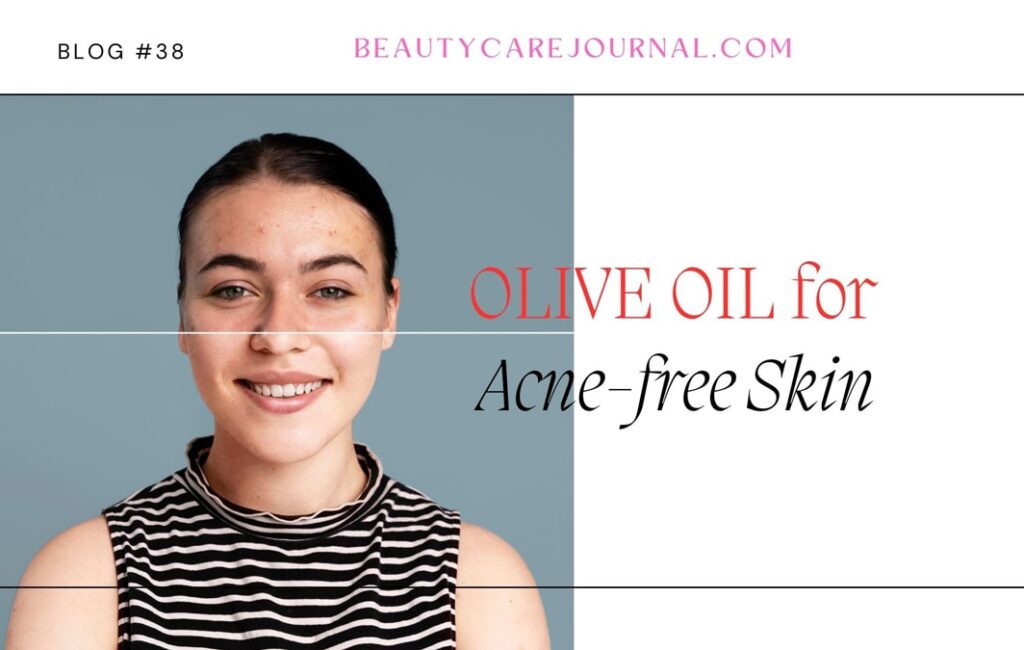
Acne may be a persistent problem for you, but the remedy may be easier than you realize. Olive oil, a common culinary ingredient, may also be an effective and best acne treatment. Olive oil is high in antioxidants and has anti-inflammatory effects, so it can help soothe sensitive skin, decrease redness, and unclog pores.
Benefits of Using Olive Oil for Best Acne Treatment
Moisturizes the skin
Olive oil penetrates deep into the pores, nourishing the skin without blocking it.
Antibacterial properties
Its antimicrobial capabilities assist in destroying acne-causing germs, reducing inflammation, and preventing outbreaks.
Reduces scarring
Regular usage of olive oil can help reduce acne scars and blemishes, resulting in a smoother skin texture.
How does Olive Oil Remove Acne?
Because of its unique qualities, olive oil is an efficient and best acne treatment tool. Here’s how it helps:
- Antioxidant: Olive oil includes antioxidants such as vitamins E and K, which help heal damaged skin cells and prevent future outbreaks.
- Anti-inflammatory: Olive oil’s anti-inflammatory qualities can help lessen the swelling and redness associated with acne.
- Moisturizers: Contrary to common opinion, olive oil may moisturize the face without blocking pores, making it ideal for acne-prone skin.
- Antibacterial: Olive oil contains antibacterial characteristics that can help destroy acne-causing germs, lowering the risk of future outbreaks.
How to Use Olive Oil for Best acne Treatment
- Choose cold-pressed Extra Virgin Olive Oil: Choose high-quality, cold-pressed extra virgin olive oil for the best skincare results.
- Patch Tests: Before using olive oil on your face, run a patch test on a tiny area of skin to rule out any adverse reactions.
- Cleanse your skin: Before using olive oil, wash your skin with a light cleanser to remove any debris or makeup.
- Apply olive oil: Take a few drops of olive oil and gently massage it into your skin in circular motions, concentrating on acne-prone areas.
- Leave overnight: To achieve the maximum benefits, keep the olive oil on overnight to permeate the skin thoroughly.
- Rinse off in the morning: In the morning, wash your face with water to eliminate any extra oil.
Add-on Benefits: for best acne treatment
You can add on some other ingredient for special cara
Lemon juice: a potent acne treatment
Combine a few drops of lemon juice and olive oil to make a powerful best acne treatment. Lemon juice contains citric acid, which helps exfoliate and lighten acne scars.
Green tea: to make a calming toner
Brew some green tea and combine it with olive oil to make a calming toner for acne-prone skin. Green tea is high in antioxidants, which can help decrease inflammation and redness.
Turmeric: anti-inflammatory and antibacterial
Make a paste out of turmeric powder and olive oil, then apply it on acne patches. Turmeric contains anti-inflammatory and antibacterial qualities that can help to relieve acne and prevent future outbreaks.
Oatmeal: to produce a light exfoliating mask
Combine cooked oatmeal and olive oil to make a mild exfoliating mask for acne-prone skin. Oatmeal can help remove excess oil and soothe sensitive skin.
Yoghurt: for a hydrating mask
Combine yoghurt and olive oil to make a moisturizing mask for acne-prone skin. Yogurt includes probiotics, which can help regulate the skin’s microbiota and decrease inflammation.
Cinnamon: to create a spot treatment
To make a spot treatment for acne, combine cinnamon powder and olive oil. Cinnamon contains antimicrobial qualities that can help eliminate acne-causing germs.
Avocado: to produce a nutritious mask
Mash avocado and combine with olive oil to make a nutritious mask for acne-prone skin. Avocado is high in vitamins and antioxidants, which can help maintain healthy skin.
Sugar: for a light exfoliating scrub
Combine sugar and olive oil to make a mild exfoliating scrub for acne-prone skin. Sugar can help eliminate dead skin cells and clear clogged pores, lowering the likelihood of outbreaks.
Precautions and Tips for Using Olive Oil
- Avoid Overuse: Use olive oil in moderation to prevent excessive greasiness and potential pore blockage.
- Choose Non-Comedogenic Products: If you have oily or acne-prone skin, opt for non-comedogenic olive oil products to avoid exacerbating acne.
- Consult a Dermatologist: If you experience any adverse reactions or worsening of acne symptoms, consult a dermatologist for personalized advice.
- Comedogenicity: Olive oil has a relatively high comedogenic rating, which can clog pores, particularly for those with oily or acne-prone skin. Using too much olive oil or not thoroughly cleaning the skin afterwards might result in closed pores and exacerbated acne outbreaks.
- Allergic Reactions: While rare, some individuals may be allergic to olive oil. Allergic responses can cause redness, itching, swelling, or hives. Before using olive oil frequently, conduct a patch test to ensure that there are no bad responses.
- Irritation risk: Oliv oil may irritate sensitive skin. This can happen if the oil isn’t adequately diluted or if it gets in contact with cracked or injured skin. Use olive oil with caution and cease if discomfort occurs.
- Greasy Feel: Olive oil’s thick nature can leave a greasy residue on the skin, especially when used in excessive amounts. This greasy texture may not be ideal for everyone, especially those with oily skin who prefer thinner, non-comedogenic moisturizers.
- Staining: If not properly cleaned, olive oil can leave stains on clothing and bedding. It is important to use caution while using olive oil to avoid staining clothes.
- Not suited for All Skin Types: Although olive oil has numerous benefits, it may not be suited for everyone. Individuals with severe acne, fungal acne, or certain skin problems should avoid using olive oil and instead seek tailored skincare suggestions from a specialist.
FAQs:
1: Can olive oil worsen acne?
While olive oil is typically harmless for most skin types, it can aggravate acne for certain people, particularly those with oily or acne-prone skin. Before utilizing olive oil on a large scale, you must undertake a patch test.
2: How often should I use olive oil for acne?
You may use olive oil to cure acne on a daily or weekly basis, depending on your skin’s tolerance. Begin with a small quantity and modify as necessary.
3: Are there any side effects of using olive oil for acne?
Side effects are uncommon, although some people may have blocked pores or allergic responses. If you experience any harmful effects, discontinue usage.
4: Is olive oil the best acne treatment?
Olive oil’s anti-inflammatory qualities may help relieve irritated or inflamed skin. Olive oil includes antioxidants like vitamin E. Antioxidants reduce the redness and irritation produced by acne or psoriasis. They help guard against free radicals, which can cause wrinkles and premature aging of the skin.
Conclusion:
Olive oil is more than just a cooking ingredient; it may also be an effective and best acne treatment. Its antioxidant, anti-inflammatory, and antibacterial characteristics make it an ideal natural therapy for cleaner, healthier skin. Incorporate olive oil into your skincare routine and say goodbye to acne forever!


